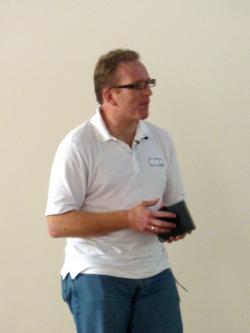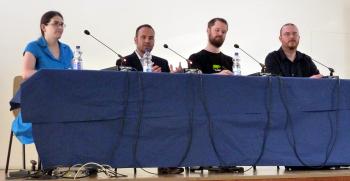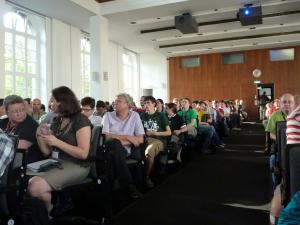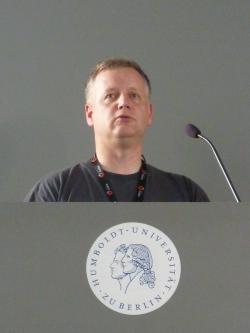KDE Having Fun at Desktop Summit 2011
Friday, 5 August - Preparations for a Big Event
Friday, 10:00, August 5, 2011. A big group of people was standing a bit lost in the cloakroom of the Humboldt University at Unter den Linden, Berlin. They were the volunteers for the Desktop Summit 2011 - but without guidance and leadership, they were just nervously looking around and talking to each other.
But at 11:00, Mirko Boehm came in, gathered everyone together and told them what to do! Tables got moved, tape stuck to floors, posters hung up.
Meanwhile, another group of volunteers began gathering at c-base, worlds' first hacker space and site of the oldest crashed space station on Earth. Thanks to sponsor Igalia, several hundred attendees came to this pre-registration event to have drinks and conversation in the creative space of c-base. This also gave the registration team an opportunity to figure out good processes for namebadges and lunch vouchers. And allowed the first visitors get their badges, a welcome hug and lunch tickets for the rest of the week. A long day of hard work, and the team was ready for the official opening of Desktop Summit.

Dirk Hohndel
Saturday, August 6 - The Summit Begins
Mirko Boehm opened the Desktop Summit and handed over the microphone to the first keynote speaker, Dirk Hohndel. Dirk spoke about where Linux Desktops came from and where they are going. He expressed his happiness with Free Desktop projects moving beyond copying commercial products to making their own choices and providing leadership. He stressed the importance of listening to users in making those choices. Dirk then got on the subject of collaboration and suggested that while disagreements might make the news, restraint, flexibility and openness make for better products and more satisfaction for users and contributors. Dirk's talk was a delightful, meaningful introduction to the collaborative Desktop Summit.As the conference moved into the general schedule, attendees heard from project leaders and FOSS contributors in more detail on various subjects related to to common desktop interests. For the most part, presentations will be available on line soon.
Copyright Assignment Panel
The panel on copyright assignment, licensing and similar rights assignment policies was highly anticipated. CA is a hot issue in the Free software world, dealing with the potential conflict of interests between company/project managers and contributors. Some companies and projects require copyright assignment, while developers naturally want to understand what will happen to their code. The discussion touched on Project Harmony, an effort led by Canonical to define a set of contributor agreements and simplify the choices in the same way that Creative Commons makes it easier to choose a free license for creative works.
The panel was made up of key figures in the Free Software community from both sides of the debate. Mark Shuttleworth, founder of Canonical, promoted contributor agreements as essential to building a thriving ecosystem around Free Software. Michael Meeks, part of the LibreOffice founding team and long time GNOME contributor, explained how he was once in favor of assigning his copyright to larger projects. Now he has come to see problems in terms of what he calls the "Scalability, Copyright and Ownership" problems. Most companies that require copyright assignment (e.g., MySQL) end up doing most of the work themselves rather than getting real support from the community. Moreover, you can expect conflicts and FUD due to copyright issues. Finally, CA leads to less feeling of ownership by the community which in turn leads to maintenance problems. Bradley Kuhn of the Software Freedom Conservancy and the Free Software Foundation is also generally against copyright assignment to companies, arguing that projects choose licenses that reflect their values and contributor agreements change that.

Copyright assignment panel: Karen Sandler, Mark Shuttleworth, Michael Meeks and Bradley Kuhn
The discussion was lively. Mark asserted that "freedom is not on the table for discussion. Freedom is absolute", a point challenged by Bradley who argued that software freedom is "always on the table" and thus needs to be actively protected.
Shuttleworth's comment that "Linux, the Free software system, is not thriving on the client" set off another series of comments and rebuttals about funding vs contribution. In order for FOSS to thrive in the desktop environment, Mark says that companies - especially startups - need what copyright assignment offers. It gives them a competitive advantage which makes it easier for them to make money. Meeks agreed that a stronger, broader ecosystem would be great, but copyright assignment defeats the point of Free Software as it creates monopolies. Mark didn't like to talk about monopolies, as "in terms of access to the code there is no monopoly", but Bradley disagreed, pointing out that, under most assignment circumstances, only one company can take the code proprietary. This is indeed the 'competitive advantage' which was being discussed.
Michael said that ownership is critical, because "if people don't feel they own part of the code, they feel very differently about the project ... they have at best weak allegiance to the project."
Bradley pointed to the value of placing trust in an organization like the Free Software Foundation. Mark suggested that it makes sense to "trust the organization where your code fits, if you want your code to thrive." And added that, "you have to choose how you want your code to behave in a world of change. I believe the moral right lives with the project." In other words, code without the project it belongs to loses its value. So ownership by the project or company makes sense.

A full audience for the debate
On the issue of patents, the differences of opinion were again on display. Mark asserted that, under the Harmony agreements, a contributor does not give away patent rights, but rather provides the necessary rights to ship the code. The debate centered on whether contributors receive the same rights back from the company with respect to patents that they themselves are expected to provide. Meeks said he has problems with the inequality which is created by the copyright assignment and he believes there's enough competition already, we don't need an advantage for a single company. He pointed out that contributors could end up in a situation where even they themselves don't have the right to ship the software they wrote themselves, despite a permissive license, because the patents are owned by the company they assigned their code to.
Mark Shuttleworth ended the discussion with a comment on generosity: "giving something to somebody is generous, you should try that, it is very satisfying". This resulted in quite some hallway discussions. It seemed to be inappropriate to some to lecture on generosity to a room full of Free Software developers!
Hallway track
Between and during the talks, the hallway track was well attended. Groups of people were meeting face to face everywhere; some were grumpy that there wasn't enough 'hacking space'. Access to AC was also limited, but an empty battery means having talk to people, which was quite good for the general atmosphere! The main hall was quite lively, with a number of info booths and in the registration area you can buy t-shirts, stickers, flyers and other swag. Outside, people gathered for a smoke or just to enjoy the sun, escaping from time to time into the shade of the majestic trees in the courtyard. Some even took a stroll, enjoying the area around the University.Lunch was in the Uni's canteen with pasta and salad. This was all washed down with the drink of the week, Club Mate, a carbonated caffeine drink made from the popular South American tea. It's not too heavy and keeps you alert. Thank you, Intel, for keeping us in supply.
In the evening, a large group headed back to c-base for a barbecue, while others went out in various directions to enjoy Berlin and its good food. Berlin is a fun city. Big, but friendly, active, accessible, with a mix of old and modern. Crumbling cement alongside elegant structures, greenery. There's no opportunity to be bored.
KDE at the Desktop Summit
While there were a number of talks by GNOME and KDE developers during the day, we'd like to touch on a few interesting talks which were about where KDE, as a community, stands.
Stu Jarvis from the KDE Promo team gave one of the community keynotes, asking what KDE is for nowadays. He explained that when KDE started, the motivations were clear: to make a Linux desktop environment that was as good as that available on Windows 95 and so to make Linux and free software usable by normal people. But we achieved that aim many years ago. Now we have all kinds of KDE software, including those that have their own release schedule, that do not use the KDE Platform (for example, Marble has a Qt only version) and software that is not about the Linux desktop at all, such as ownCloud. Stu referred to a TED talk that looks at how organisations need to understand not only what they do and how, but also why - and to communicate that if they want people to listen to them.

Knut Yrvin on how KDE helps Qt
Asked what was KDE specific about the message, Stu acknowledged that most of the ideas apply to the whole freedesktop community, not just KDE. However, he argued that KDE is branching out more already, while the core of GNOME maintains a desktop focus. There are however groups and companies in the GNOME ecosystem looking much wider than the Linux destop and perhaps some opportunities for collaboration.
Another talk of interest to anyone in the free software community (and beyond) was given by Thomas Thym on conflict resolution. He argued that the normal obsession with finding out who is to blame for problems is counterproductive and it is much better to look at people's interests than positions to work towards a solution that everyone can live with
Knut Yrvin, Community Manager for Qt Development Framework, reported on the expansion in the use of Qt; it's everywhere, even on projectors in cinemas. Nokia is a big contributor, KDAB as well. In addition, at least 23 KDE people contributed 46,000 lines of code in 2010. And KDE is a major contributor to market awareness of Qt in subtle ways. 30% of developers surveyed recently reported discovering Qt through their use of FOSS, especially KDE. Meanwhile, Google Summer of Code introduces many students to Qt.